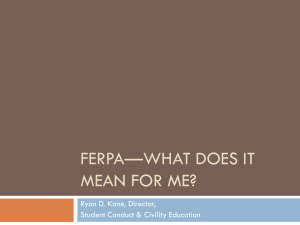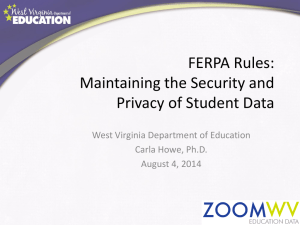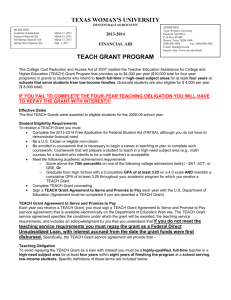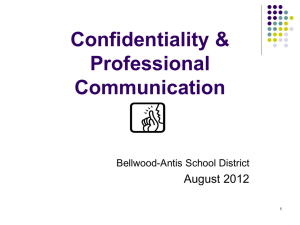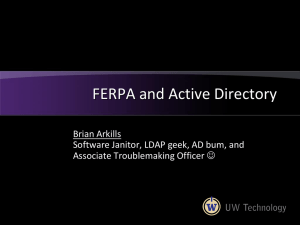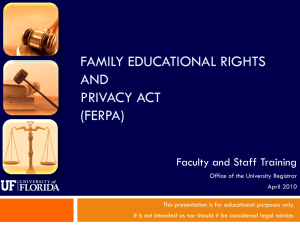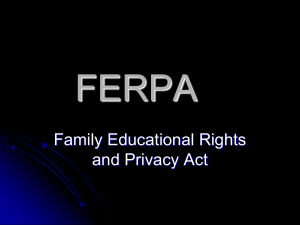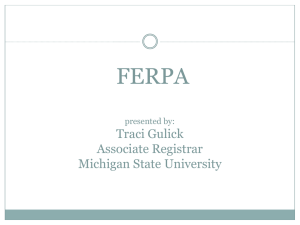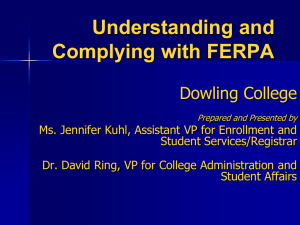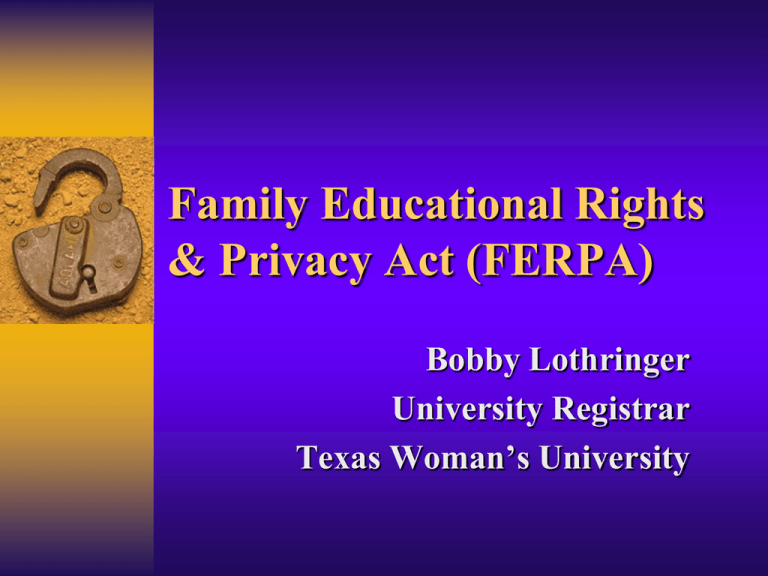
Family Educational Rights
& Privacy Act (FERPA)
Bobby Lothringer
University Registrar
Texas Woman’s University
What is FERPA?
FERPA is a Federal Law (also known as the
Buckley Amendment)
Protects the privacy of a student’s educational
records
Applies to all educational agencies or
institutions that receive funds under any
program administered by the U.S. Department
of Education
Primary Rights under FERPA
FERPA ensures students the following
primary rights:
Right to inspect and review education records
Right to seek to amend education records
Right to have some control over the disclosure
of information from education records
What if FERPA is violated?
An institution can lose all federal funding
(including financial aid and educational grants)
A student can be put in jeopardy
Definitions
Student: any individual who is or has been in
attendance at TWU for whom TWU maintains an
educational record
Educational Record: any record (handwritten,
printed, taped, filmed, or preserved in any
medium) that is maintained by TWU or its agent
and that is directly related to a student.
Definitions (cont.)
School Official: any administrator, faculty, staff,
committee member, or student employee who performs a
function or task on behalf of or at the request of the
university. Also may include contractors, consultants,
volunteers or other individuals to whom the university has
outsourced a university function.
Legitimate Education Interest: information needed for a
school official to fulfill their official professional
responsibilities.
Directory Information: information contained in the
education record of a student that would generally not be
considered harmful or an invasion of privacy if released.
Educational Records
Education records at TWU do not include:
• Records/notes in sole possession of maker not
accessible or revealed to any other person except a
temporary substitute
• Alumni records containing info collected after the
student is no longer in attendance and not related to
individual’s attendance as a student
• An employment record of an individual if the
employment is not contingent on status as a student
and record is only used in relation to employment
Educational Records
Education records at TWU do not include:
• Records created and maintained by the campus
police for law enforcement purposes
• Records created and maintained by physicians or
psychologists used only for treatment and are only
made available to those providing treatment
• Grades on peer-graded papers before they are
collected and recorded by an instructor
Educational Records
Educational records containing personally identifiable
information cannot be released to anyone without
signed, written authorization from the student
specifying the specific information to be released and to
whom.
The law does provide certain exceptions that will allow
for an institution to release personally identifiable
information from a student’s education record without
student consent. The institution must specify the
exceptions in its annual FERPA notification to
students.
Educational Records
TWU may disclose personally identifiable information
from a student’s record without student consent to:
– School officials who have a legitimate educational interest
– Parents when:
• student is claimed as dependent on most recent tax return
• student has violated a federal, state, or local law governing alcohol or
controlled substances and the student is under 21
• a health or safety emergency necessitates disclosure to protect the
health or safety of the student or another individual
– Officials of another school to which a student seeks or intends to
enroll
– Certain representatives of the federal government
– State educational authorities
– Accrediting organizations
– Appropriate parties in a health or safety emergency
Educational Records
TWU may disclose personally identifiable information
from a student’s record without student consent to:
– Organizations conducting studies for or on behalf of educational
institutions or agencies
– Financial aid personnel in conjunction with an application for or
receipt of financial assistance
– Individuals delivering a judicial order or lawfully issued subpoena
– Victims of an alleged perpetrator of a crime of violence or a nonforcible sex offense
– Any member of the public in matters relating to sex offenders and
information provided to TWU under relevant Federal law.
– To the originating party identified as the party that created the
record (i.e. transcript from previous institution to verify validity)
– Individuals requesting records for students who are deceased
– Directory information
Directory Information at TWU
Name
Address
University assigned e-mail
address
Telephone listings
Month, day & place of birth
Major field of study
Degrees, honors & awards
received (including selection
criteria)
Dates of attendance
Most recent previous school
attended
Classification
Participation in officially
recognized activities & sports
Weight & height of members of
athletic teams
Photograph
Expected graduation date
Dissertation & thesis titles
Enrollment status
– UGRD or GRAD
– Full or Part time
Directory information can
NEVER include:
Social Security number
Student ID number
Race
Ethnicity
Nationality
Gender
Withholding Directory Information
Students have the right to have their directory information
withheld
Student must request in writing prior to the census date to have
their directory information withheld to ensure it will not be
released.
Once the withhold directory information flag is placed on the
student’s account, it will remain in perpetuity, even after
graduation, until the student requests in writing for it to be
removed.
To verify if the directory information has been withheld, check the
“Dirctry” field in the BIO mnemonic. If the field has “N”, then the
student has opted to have their directory information withheld.
Once the information is withheld, NO information on the student,
not even an acknowledgement of existence, can be released without
the student’s signed, written consent.
QUIZ
TRUE or FALSE?
#1: A 17 year old student is taking summer
courses at TWU, and their parent calls to
find out their course schedule. Since the
student is under the age of 18, you can
provide this information to the parent
without a release or proof of dependency.
FALSE
TRUE or FALSE?
#2: The parent of a 16 year old dual credit
student from the local high school calls asking
for the final grade the student made in the
course. Since the student is a dual credit
student and still in high school, where the
parent shares the FERPA rights with the
student, you can provide this information.
FALSE
Once a student enrolls in a course at the postsecondary level, regardless of the student’s age
or career level, all FERPA rights transfer solely
to the student for those records related to the
post-secondary enrollment.
Parents can either provide a student-signed
written release or proof of dependency.
#3: You receive an email from a student
asking about specific educational
information. The email address is
txrangers#1fan@yahoo.com. Can you
provide the information?
No. Since it is not the university-assigned
email address, you cannot verify the
identify of the sender.
#4: You receive an e-mail from rangers#1fan@yahoo.com
asking for registration dates and course offering
information. You reply to the email with the requested
information. Has a FERPA violation occurred?
No, as long as the information provided is general in
nature and does not contain any specific, personally
identifiable student information.
True or False
#5: Spouse of a student calls asking for a
student’s schedule so they can bring them
lunch. They have the student ID, the SSN, and
the date of birth. With this combination of
information, you can provide them the
requested items.
FALSE
#6: Student is on the phone and does not know
their school ID and wants to provide their SSN
for you to access their record. Can you use the
SSN to retrieve their record?
No. By using the SSN to retrieve their record,
you are confirming the SSN. For verification
over the phone when there is no photo ID to
verify, use a combination of questions (3-5) to
ensure proper identify (name, date of birth, last
4 of SSN, phone number, address).
True or False
#7: A spouse of a student who is also a faculty
member at TWU calls asking for specific
information from the student’s educational
record. Since they are an employee of the
institution, you can provide this information.
False.
School official must have a legitimate educational
purpose (information is needed to fulfill their
professional responsibilities).
True or False
#8: Dr. Einstein does not use blackboard, and
wishes to post his classes’ grades outside his
office door. In doing so, he has violated
FERPA.
Maybe.
Grades can never be posted using any personally
identifiable information, or any portion of a
student’s name or ID. Grades CAN be posted
if the instructor assigns each student a random
identifier that is only shared between the
instructor and the student, and contains no
part of any personally identifiable information.
True or False
#9: Julie has requested that TWU withhold her
directory information. Since her directory
information is withheld, instructors cannot call
her name out loud when taking attendance and
cannot include her name on an attendance roll
sheet that is passed around.
FALSE
The Department of Education has verified that
students do not have the right to be anonymous
in class, and there is no right to privacy that
prevents them from being on an attendance roll
sheet or participating in class groups.
True or False
#10: A student who is running for political office
mentions in a news conference a number of
specific items regarding their academic record.
A newspaper calls you to verify if what they
said is true. Since the student has already put
it out in the public domain, they have provided
implied consent and you are free to confirm
their public claims.
False
There is no implied consent with FERPA.
#12: Joanna is a member of the softball team and
will be out of town for a game on the day you
hand back the students’ graded research paper
proposals. She has asked her friend Bridget to
pick her paper up so she can get started on it as
soon as she returns. How would it be
permissible for you to allow Bridget to pick up
Joanna’s graded paper?
Joanna can sign a written release specifying that
she gives permission to Bridget to pick up her
paper.
Remember…
When in doubt, don’t give it out!
FERPA Help & Training
Bobby Lothringer
Registrar
rlothringer@twu.edu
http://www.twu.edu/registrar/academicrecords-policy.asp



